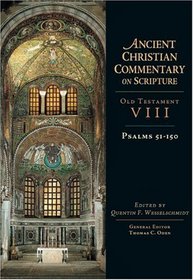Search -
Psalms 51-150 (Ancient Christian Commentary on Scripture)
Psalms 51-150 - Ancient Christian Commentary on Scripture
Author:
and lt;p>The Psalms have long served a vital role in the individual and corporate lives of Christians, expressing the full range of human emotions, including some that we are ashamed to admit. The Psalms reverberate with joy, groan in pain, whimper with sadness, grumble in disappointment and rage with anger. and lt;/p> and lt;p>The church father... more »
Author:
and lt;p>The Psalms have long served a vital role in the individual and corporate lives of Christians, expressing the full range of human emotions, including some that we are ashamed to admit. The Psalms reverberate with joy, groan in pain, whimper with sadness, grumble in disappointment and rage with anger. and lt;/p> and lt;p>The church father... more »
ISBN-13: 9780830814787
ISBN-10: 0830814787
Publication Date: 11/30/2007
Rating: ?
ISBN-10: 0830814787
Publication Date: 11/30/2007
Rating: ?
0 stars, based on 0 rating
Genres:
- Religion & Spirituality >> General
- Christian Books & Bibles >> Bible Study & Reference >> Commentaries >> Old Testament
- Christian Books & Bibles >> Bible Study & Reference >> Bible Study >> Old Testament




